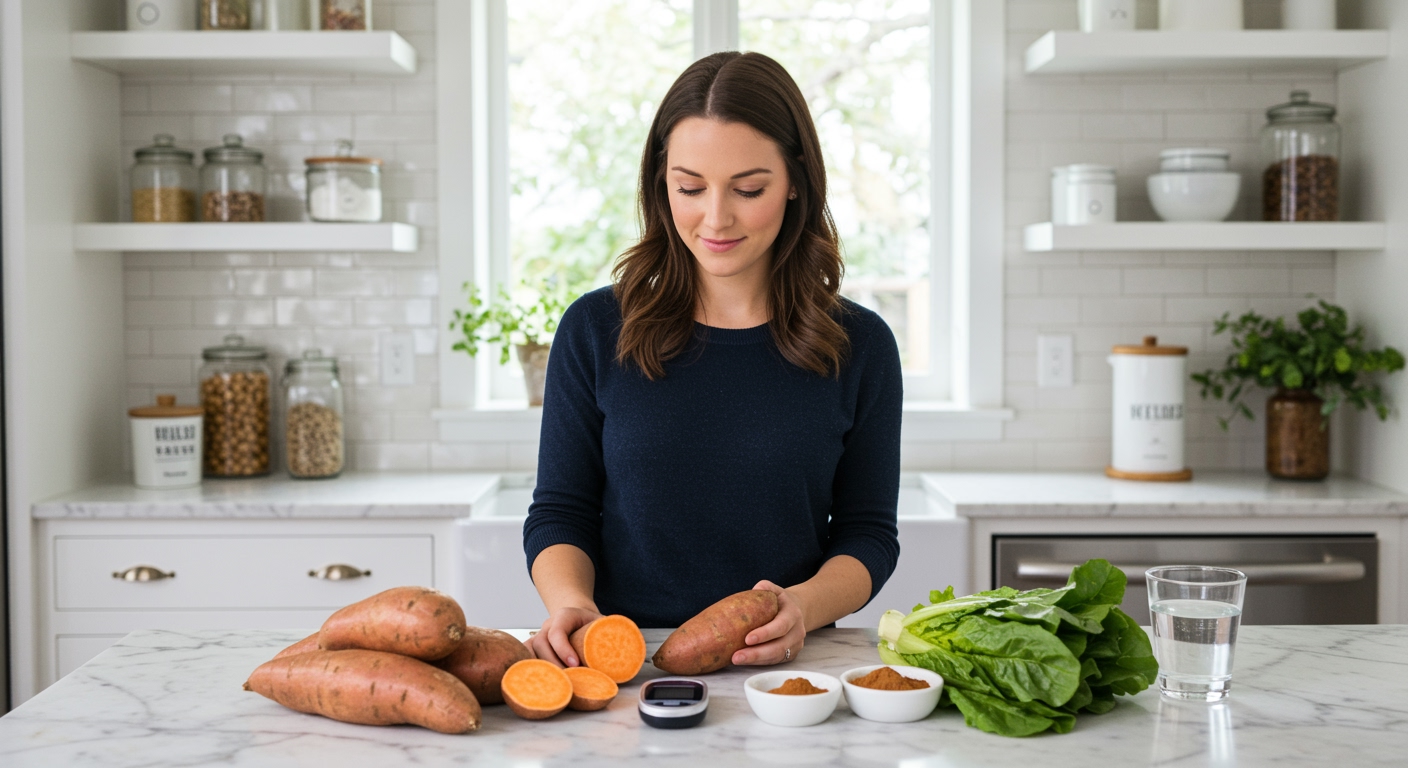✪ Key Takeaway: Sweet potatoes can benefit PCOS when eaten in proper portions with protein and fiber, but timing and preparation method matter significantly.
Introduction
You scroll through PCOS forums and see women raving about sweet potatoes as miracle foods while others complain about blood sugar spikes after eating them.
This confusion happens because most advice about sweet potatoes and PCOS ignores the critical details that determine whether this orange root helps or hurts your hormonal balance.
Hi, I’m Abdur, your nutrition coach and today I’m going to explain exactly when sweet potatoes support PCOS management and when they might sabotage your progress.
What Makes Sweet Potatoes Different From Regular Potatoes?
Sweet potatoes contain more fiber and antioxidants than regular white potatoes, which affects how your body processes their natural sugars.
The glycemic index of sweet potatoes ranges from 45 to 94 depending on cooking method, while white potatoes consistently score above 80.
This difference matters for women with PCOS because insulin resistance makes your cells less responsive to insulin signals.
When you eat foods with lower glycemic impact, your pancreas does not need to pump out massive amounts of insulin to clear glucose from your bloodstream.
Sweet potatoes also provide beta-carotene, which your body converts to vitamin A for hormone production and immune function.
The potassium content in sweet potatoes helps regulate blood pressure, which often runs high in women with PCOS due to insulin resistance.
✪ Fact: Boiled sweet potatoes have a glycemic index of 45, while baked ones can reach 94 due to sugar concentration during cooking.
How Do Sweet Potatoes Affect Insulin Levels?
The cooking method dramatically changes how sweet potatoes impact your blood sugar and insulin response.
Boiling sweet potatoes keeps their resistant starch intact, which feeds beneficial gut bacteria and slows glucose absorption.
Baking or roasting breaks down these protective starches and concentrates the natural sugars, creating a faster insulin spike.
When you eat sweet potatoes with protein and healthy fats, the combination slows digestion and reduces the glycemic impact.
The portion size also determines whether sweet potatoes help or hurt your PCOS symptoms.
A half-cup serving provides beneficial nutrients without overwhelming your insulin system, while larger portions can trigger the same problems as eating candy.
Eating sweet potatoes after exercise takes advantage of your muscles increased insulin sensitivity to clear glucose more efficiently.
✪ Pro Tip: Pair sweet potato with Greek yogurt or nuts to slow sugar absorption and prevent insulin spikes.
Can Sweet Potatoes Help With PCOS Weight Management?
Sweet potatoes can support weight loss for PCOS when they replace processed carbohydrates in your diet.
The fiber content helps you feel full longer, reducing the urge to snack on high-calorie processed foods between meals.
However, many women make the mistake of adding sweet potatoes to their existing carbohydrate intake instead of using them as replacements.
One medium sweet potato contains about 112 calories and 26 grams of carbohydrates, which must fit within your daily carb budget for weight loss.
The satiety factor of sweet potatoes works best when you eat them as part of balanced meals rather than standalone snacks.
Women with severe insulin resistance may need to limit sweet potatoes to post-workout meals when their muscle cells are most receptive to glucose uptake.
The key is monitoring your individual response through blood sugar testing or tracking how you feel after eating them.
✪ Note: Replace refined grains with sweet potatoes rather than adding them to your existing carb intake for weight management success.
What Is The Best Way To Eat Sweet Potatoes For PCOS?
Timing your sweet potato consumption around physical activity maximizes their benefits for PCOS management.
Eat them within two hours after exercise when your muscles are primed to absorb glucose without requiring excessive insulin production.
Choose boiling or steaming over baking to preserve resistant starch and minimize blood sugar spikes.
Always combine sweet potatoes with protein sources like chicken, fish, eggs, or Greek yogurt to slow digestion.
Add healthy fats such as olive oil, avocado, or nuts to further reduce the glycemic impact and increase nutrient absorption.
Limit portions to half a cup or one small sweet potato to avoid overwhelming your insulin system.
Consider eating sweet potatoes earlier in the day when your cortisol levels are naturally higher and can help process the glucose more effectively.
✪ Pro Tip: Cool cooked sweet potatoes in the refrigerator overnight to increase resistant starch content before reheating.
Are There Any Risks Of Eating Sweet Potatoes With PCOS?
Women with severe insulin resistance may experience blood sugar spikes even from properly prepared sweet potatoes.
Some individuals have genetic variations that make them more sensitive to carbohydrates regardless of the source or preparation method.
Eating sweet potatoes late in the evening can interfere with sleep quality due to blood sugar fluctuations during the night.
The natural sugars in sweet potatoes can trigger cravings for more sweet foods in women who struggle with sugar addiction.
Overconsumption of sweet potatoes can contribute to weight gain and worsen PCOS symptoms despite their nutritional benefits.
Women taking diabetes medications should monitor their blood sugar closely when adding sweet potatoes to avoid hypoglycemia.
The high vitamin A content in sweet potatoes can accumulate to toxic levels if consumed in excessive amounts over long periods.
✪ Note: Test your individual response with a glucose meter or track symptoms to determine if sweet potatoes work for your PCOS management.
The Bottom Line
Sweet potatoes can be beneficial for PCOS when consumed mindfully with attention to preparation method, portion size, and timing.
The best nutrition advice is worthless if it does not account for your individual response and lifestyle reality.
I would love to hear about your experience with sweet potatoes and PCOS in the comments below – do they help stabilize your energy or cause unwanted symptoms?
References
At NutritionCrown, we use quality and credible sources to ensure our content is accurate and trustworthy. Below are the sources referenced in writing this article:





